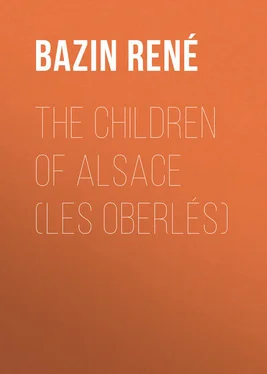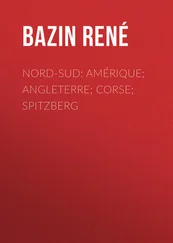René Bazin - The Children of Alsace (Les Oberlés)
Здесь есть возможность читать онлайн «René Bazin - The Children of Alsace (Les Oberlés)» — ознакомительный отрывок электронной книги совершенно бесплатно, а после прочтения отрывка купить полную версию. В некоторых случаях можно слушать аудио, скачать через торрент в формате fb2 и присутствует краткое содержание. ISBN: , Жанр: foreign_language, foreign_antique, foreign_prose, на английском языке. Описание произведения, (предисловие) а так же отзывы посетителей доступны на портале библиотеки ЛибКат.
- Название:The Children of Alsace (Les Oberlés)
- Автор:
- Жанр:
- Год:неизвестен
- ISBN:http://www.gutenberg.org/ebooks/34957
- Рейтинг книги:5 / 5. Голосов: 1
-
Избранное:Добавить в избранное
- Отзывы:
-
Ваша оценка:
- 100
- 1
- 2
- 3
- 4
- 5
The Children of Alsace (Les Oberlés): краткое содержание, описание и аннотация
Предлагаем к чтению аннотацию, описание, краткое содержание или предисловие (зависит от того, что написал сам автор книги «The Children of Alsace (Les Oberlés)»). Если вы не нашли необходимую информацию о книге — напишите в комментариях, мы постараемся отыскать её.
The Children of Alsace (Les Oberlés) — читать онлайн ознакомительный отрывок
Ниже представлен текст книги, разбитый по страницам. Система сохранения места последней прочитанной страницы, позволяет с удобством читать онлайн бесплатно книгу «The Children of Alsace (Les Oberlés)», без необходимости каждый раз заново искать на чём Вы остановились. Поставьте закладку, и сможете в любой момент перейти на страницу, на которой закончили чтение.
Интервал:
Закладка:
Sometimes he added: "You do not understand, then, all the sacrifice that I am making! I am sparing my children these sacrifices; I am devoting myself to them. But that does not mean that I am not suffering."
He did suffer in fact, and so much the more that the confidence of the German administration was hard to gain. The reward of so much effort did not seem enviable. True, those in office began to flatter, to draw nearer, to seek out M. Joseph Oberlé, a precious conquest, of which many district directors had boasted in high places. But they watched him, whilst loading him with invitations and kind attentions. He felt the hesitation, the mistrust, scarcely disguised, sometimes even emphasised by the new masters he wished to please. Was he safe? Had he taken the side of the Annexation without any mental reservation? Did he sufficiently admire the German genius, German civilisation, German commerce, the German future? One had to admire so much and so many things!
The answer, however, became more and more affirmative. There was the acknowledged desire to make his son, Jean, enter the German magistracy, and there was the systematic continuation of this kind of exile imposed on the young man. When his classical studies were finished and his final examination passed with success at the end of the scholastic year, 1895, Jean spent his first year of law studies at the University of Munich; he divided the next year between Bonn and Heidelberg; then took his licentiate's degree at Berlin, where he went through the Referendar Examination. At last, after a fourth year, when as a licentiate in law he entered the office of a lawyer at Berlin, after long travel in foreign countries, the young man came back to his home to rest before joining a regiment.
Truly the plan had been thoroughly carried out. In the first years of his student life, in his holidays even, excepting some days given to his family, his time had been given to travelling. During the last years he had not even appeared in Alsheim.
The end of it was that the administration no longer suspected him. Besides, one of the great obstacles to a public reconciliation between the functionaries of Alsace and M. Joseph Oberlé had disappeared. The old protesting deputy, seized by the illness which became chronic, retired from political life in 1890. From that moment dated, for the son, the smiles, the promises, the favours so long solicited. M. Joseph Oberlé recognised in the development his affairs had taken – in the Rhenish country and even beyond it – in the diminution of the official reports directed against his employés, or against himself in cases of contravention, in the signs of deference which the small officials showed him – formerly the most arrogant of all, in the ease with which he had ruled disputable points, obtained authorisations, altered the rules in divers points – in all these signs, as well as in others, he recognised that the governmental mind, present everywhere, incarnate everywhere in a multitude of men of gold lace – was no longer against him.
More definite advances were made to him. The preceding winter, while Lucienne, who had returned from the Mündner school, pretty, witty, charming, was dancing in the German salons of Strasburg, the father was talking with the representatives of the Empire. One of them, the prefect of Strasburg, Count Kassewitz, acting probably in accordance with superior orders, had let drop that the Government would see, without displeasure, M. Joseph Oberlé present himself as candidate for the deputyship in one of the districts of Alsace, and that the official support of the administration would be given to the son of the old protesting deputy.
This prospect filled M. Oberlé with joy. It had revived the ambition of this man who found himself up to then repaid but badly for the sacrifices of self-respect, friendships, and memories, which he had had to make. It gave new energies and a definite object to this official temperament, depressed by circumstances. M. Oberlé saw his justification in it, without being able to reveal it. He said to himself that, thanks to his energy, to his contempt for Utopia, to his clear sight of what was possible and what was not, he could hope for a future for himself – a participation in public life – a part he had believed to be reserved for his son. And henceforward it would be the answer that he would make to himself; if ever a doubt entered his mind, it would be his revenge against the mute insults offered him by some backward peasants, who forgot to recognise him in the streets, and by certain citizens of Strasburg or Alsheim, who scarcely, or no longer, saluted him.
He was therefore now going to receive his son in a frame of mind very different from that of the past. To-day, when he knew himself in full personal favour with the Government of Alsace-Lorraine, he was less set on his son carrying out to the letter the plan that he had traced at first. Jean had already assisted his father, as Lucienne was assisting him. He had been an argument, and one of the causes of this long-expected change of the governmental attitude. His collaboration was still going to be useful, but not necessary; and the father, warned by certain allusions and a certain reticence in the last letters written from Berlin by his son, did not feel so irritated when he thought that perhaps he would not follow the career in the German magistracy so carefully prepared for him, and would give up his last three years of terms and his State examinations. Such were the reflections of this man, whose life had been guided by the most unadulterated egotism, at the moment when he was preparing to receive his son's visit. For he had seen Jean and had watched him coming across the park. M. Oberlé had built at the extreme end of the saw-mill a sort of cage or footbridge, from which he could survey everything at once. One window opened on to the timber yard, and allowed him to follow the movements of the men occupied in stowing away and transporting the wood. Another, composed of a double glazed framework, placed the book-keepers under the eye of their master, ranged along a wall in a room like the master's room; and by a third, that is to say by a glass partition, which separated him from the workshop, he took in at a glance the immense hall where machines of all kinds, great saws in leather bands, cogged wheels, drills, and planes, were cutting, boring, and polishing trunks of trees brought to them on sliding grooves. Round him the low woodwork painted water-green; electric lamps in the shape of violets, the call-buttons placed on a copper plaque which served as a pediment to his work bureau, a telephone, a typewriter, light chairs painted white, spoke of his taste for bright colours, for convenient innovations, and for fragile-looking objects.
Seeing his son enter, he had turned towards the window overlooking the park; he had crossed his legs, and placed his right elbow on the desk. He examined curiously this tall, thin, handsome man, his son, who sat down facing him, and he smiled. To see him thus, leaning back in his arm-chair, and smiling his own mechanical and irrelevant smile, by only judging from the full face framed by two grey whiskers, and the gesture of his raised right hand, touching his head and playing with the cord of his eyeglass, it would be easy to understand the mistake of those who took M. Oberlé for a magistrate. But the eyes, a little closed on account of the bright light, were too quick and too hard to belong to any but a man of action. They gave the lie to the mechanical smile of his lips. They had no scientific curiosity, worldly or paternal; they sought simply a way, like those of a ship's captain – in order to pass on. Scarcely had M. Oberlé asked, "What have you to tell me?" than he added, "Have you spoken with your mother this morning?"
"No!"
"With Lucienne?"
Читать дальшеИнтервал:
Закладка:
Похожие книги на «The Children of Alsace (Les Oberlés)»
Представляем Вашему вниманию похожие книги на «The Children of Alsace (Les Oberlés)» списком для выбора. Мы отобрали схожую по названию и смыслу литературу в надежде предоставить читателям больше вариантов отыскать новые, интересные, ещё непрочитанные произведения.
Обсуждение, отзывы о книге «The Children of Alsace (Les Oberlés)» и просто собственные мнения читателей. Оставьте ваши комментарии, напишите, что Вы думаете о произведении, его смысле или главных героях. Укажите что конкретно понравилось, а что нет, и почему Вы так считаете.












